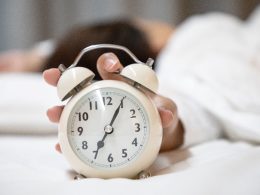Few things are surrounded by as many myths as sleep. This is hardly surprising, as this resting phase of our body determines a not inconsiderable part of our lives. As experts on the subject of sleep, we have taken a closer look at the 10 most common sleep myths and put them to the test.
Sleep myth 1: Can sleep be made up for?
Most people sleep too little and too short during the week. The alarm clock rings because work starts early. But it feels like you’ve just gone to bed. You get up dead tired and drag yourself through the day in the hope of getting a good night’s sleep at the weekend. But can you make up for a lack of sleep built up during the week by sleeping in at the weekend? Can you really catch up on missed sleep? The answer is: fortunately, yes! If you get a good night’s sleep at the weekend, you can make up for the amount of sleep you have missed and catch up on recovery and regeneration. However, you should make sure that this doesn’t completely disrupt your general sleep rhythm, as the alarm clock rings again early on Monday morning.
Sleep myth 2: Older people need less sleep
Surely everyone is familiar with the joking term ‘senile insomnia’. Older people often get up particularly early in the morning, which is interpreted as a sign that they need less sleep than younger people. But is this really true? The answer is yes and no. In fact, over-60s only need around 7 to 8 hours of sleep a day, which is significantly less than the 14 hours of sleep a baby gets in 24 hours. But even adults under 60 don’t generally need much more sleep than these 7 to 8 hours. The difference with seniors, however, is that they often enjoy several shorter sleep units throughout the day, which naturally shortens their nightly sleep duration.
Sleep myth 3: If you have sleep problems, you should exercise in the evening
A widespread sleep myth, which is particularly recommended to all those who suffer from problems falling asleep and staying asleep, is the recommendation to exercise in the evening in order to promote sleep. But is this theory true? The answer is: it depends on the type of sport. While gentle sports such as yoga, easy cycling, swimming or Nordic walking, even later in the day, can be beneficial for sleep, intensive training sessions such as spinning or jogging directly before going to bed tend to be sleep robbers. If you really want to work out, it’s better to do this at a sufficient distance from bedtime to give your body and circulation enough time to wind down.
Sleep myth 4: Yawning is contagious
One person starts yawning and everyone else joins in. A well-known phenomenon. But is yawning really contagious, as the saying goes? The answer is: yes. The contagious effect of yawning is largely based on our ability to empathise. People who empathise well with others are more likely to be infected by others yawning than those who are less empathetic.
Sleep myth 5: You only sleep well naked
Some people prefer to sleep in flannel at night, others in silk and some prefer to sleep naked. But do you really sleep better without clothes? The answer is: it depends on the individual and their own personal needs and preferences. So there’s nothing to say against thick flannel pyjamas, silk or satin nightgowns or sleeping naked. As long as you don’t overheat or freeze in bed and can sleep restfully, anything goes.
Sleep myth 6: Babies and children should sleep in their own bed
There are also some sleep myths when it comes to babies. In particular, there is a lot of concern that you will never be able to get your children out of their parents’ bed once they have been put to sleep there. But is this theory really true? The answer is: no! Co-sleeping, i.e. the family sleeping together in one bed or a shared room, is becoming increasingly popular and has many advantages. The bond between parents and child is promoted and the quality of sleep is higher and better than in separate bedrooms or sleeping areas. It is therefore more of an individual decision as to whether you want to sleep with your children in the same bed or room. There is no need to worry about children sleeping in their parents’ bed until they are teenagers. One child will voluntarily move out into their own bed earlier, the other later. But sooner or later they will all move out.
Sleep myth 7: An afternoon nap is a must
When you are overcome by a deep tiredness around midday, it calls for an afternoon nap. In fact, many people take this short break during the day to recharge their batteries and relax a little. But is it really a good idea? The answer is yes and no. Generally speaking, an afternoon nap can certainly help some people to recover and re-energise quickly. There is usually nothing wrong with a short power nap of no more than 20 minutes. However, an afternoon nap should never last longer than 30 minutes. For all those who have problems falling asleep or sleeping through the night, it is advisable not to take a nap at all.
Sleep myth 8: 8 hours of sleep is perfect
Is there really this one magical number of hours of sleep after which everyone wakes up completely rested and refreshed? The answer is: absolutely not! Sleep is a highly individual matter and the optimum amount of sleep varies from person to person. A variety of influences play an important role here: age, genetic predisposition and general constitution. Babies and children need relatively more sleep than adults and the elderly. People who are exposed to particular stress or are going through an infection have a greater need for sleep than healthy people. The optimum amount of sleep can therefore not only vary from person to person, but can also change depending on the situation. In principle, it is assumed that the quality of sleep is more important than its duration.
Sleep myth 9: You only sleep well if you don’t wake up
Anyone who has ever had to go to the toilet at night can confirm that this theory is not true. At the latest then you will definitely wake up. Other reasons may include the temperature being too high or too low, snoring bedfellows or an uncomfortable mattress. Not all of the factors mentioned mean that you can immediately speak of poor sleep. As a rule, you wake up several times during the night for short periods without realising it the next day. It only becomes problematic if you wake up regularly, find it difficult to fall asleep again and are not refreshed and regenerated the next morning. This is because the quality of sleep actually suffers from waking up at night.
Sleep myth 10: The most restful sleep is before midnight
It is said that the hours before midnight are when you sleep best. But is this true? Do you automatically sleep worse if you go to bed later? The answer to this question is a resounding yes and no. The fact is that we most often fall into deep sleep in the first few hours of our sleep, when we can recover best. As the night progresses, the deep sleep phases become less frequent and are increasingly replaced by REM sleep, our dream phases. It is therefore important that we have enough deep sleep phases to ensure good quality and regenerative sleep. This is why we generally sleep better if we fall asleep before midnight, for example around 10 pm. If you fall asleep after midnight, you experience fewer deep sleep phases and enter the REM phases more quickly, meaning you get less restorative sleep overall.














